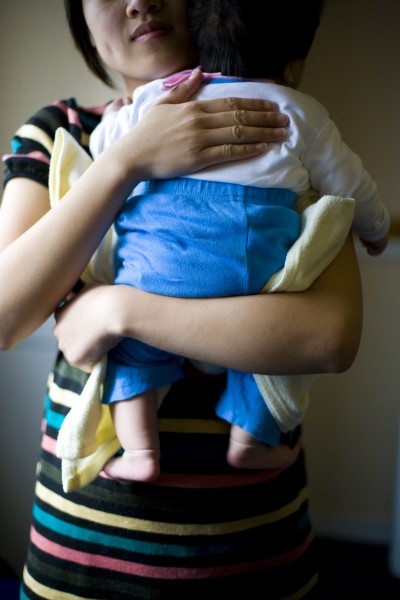Engender blog
Guest post: ‘Women and Children First?’ The reality of maternity care for Scotland’s refused asylum seekers
 By Vicky Glen
By Vicky Glen
For mothers in Scotland (and the world over), experiences of maternity care are key in influencing the overall experience of motherhood. Health policy has been a devolved matter since the creation of the NHS. As such, asylum seekers (including refused asylum seekers) are entitled to free primary and secondary health care in Scotland (in contrast with England and Northern Ireland, where refused asylum seekers may be required to pay for secondary health care, which can include maternity care). But do asylum seeking women experience a level of maternity care equal to that of other women living in Scotland?
It was this question that Sylvie Da Lomba of University of Strathclyde Law School and Nina Murray, Women’s Policy Development Officer at Scottish Refugee Council, sought to answer. While work had previously been conducted into the quality of maternity care for asylum seeking women in England and Wales, there was no primary focus upon the experiences of refused asylum seeking women. Previous work had already identified the severity of the health needs of asylum seeking women, with these needs exacerbated during pregnancy.
In light of the then proposed changes to access to healthcare under the Immigration Act 2014 (now a sad reality), and the challenging of asylum support levels by various third sector organisations (now perfectly exemplified in the case of Refugee Action v Secretary of State for the Home Department), the project aimed to assess: whether female asylum seekers were accessing free maternity care in Glasgow as ordinarily resident UK citizens (in line with Scottish government guidance); the extent and nature of any barriers to this access; and whether the access and quality of this care was in line with statutory, governmental and international human rights obligations.
Downloads
 Engender Briefing: Pension Credit Entitlement Changes
From 15 May 2019, new changes will be introduced which will require couples where one partner has reached state pension age and one has not (‘mixed age couples’) to claim universal credit (UC) instead of Pension Credit.
Engender Briefing: Pension Credit Entitlement Changes
From 15 May 2019, new changes will be introduced which will require couples where one partner has reached state pension age and one has not (‘mixed age couples’) to claim universal credit (UC) instead of Pension Credit.
 Engender Parliamentary Briefing: Condemnation of Misogyny, Racism, Harassment and Sexism
Engender welcomes this Scottish Parliament Debate on Condemnation of Misogyny, Racism, Harassment and Sexism and the opportunity to raise awareness of the ways in which women in Scotland’s inequality contributes to gender-based violence.
Engender Parliamentary Briefing: Condemnation of Misogyny, Racism, Harassment and Sexism
Engender welcomes this Scottish Parliament Debate on Condemnation of Misogyny, Racism, Harassment and Sexism and the opportunity to raise awareness of the ways in which women in Scotland’s inequality contributes to gender-based violence.
 Gender Matters in Social Security: Individual Payments of Universal Credit
A paper calling on the Scottish Government to automatically split payments of Universal Credit between couples, once this power is devolved to the Scottish Parliament.
Gender Matters in Social Security: Individual Payments of Universal Credit
A paper calling on the Scottish Government to automatically split payments of Universal Credit between couples, once this power is devolved to the Scottish Parliament.
 Gender Matters Manifesto: Twenty for 2016
This manifesto sets out measures that, with political will, can be taken over the next parliamentary term in pursuit of these goals.
Gender Matters Manifesto: Twenty for 2016
This manifesto sets out measures that, with political will, can be taken over the next parliamentary term in pursuit of these goals.
 Scottish NGO Briefing for UN Special Rapporteur on Violence Against Women
Joint briefing paper for the UN Rapporteur on Violence Against Women.
Scottish NGO Briefing for UN Special Rapporteur on Violence Against Women
Joint briefing paper for the UN Rapporteur on Violence Against Women.

Newsletter
Sign up to receive our newsletter here:
Sign up to our mailing list
Receive key feminist updates direct to your inbox: